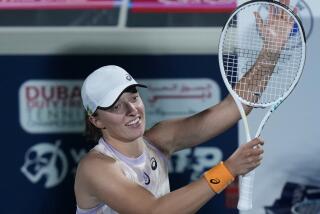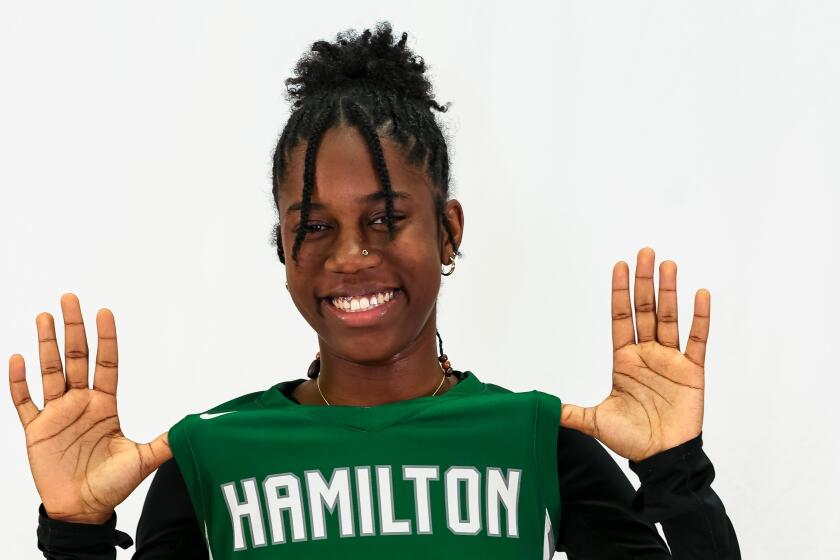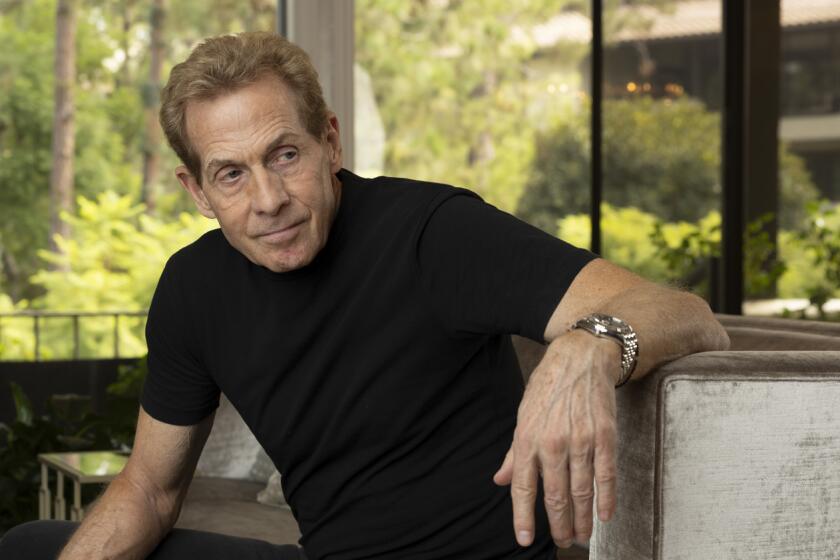No One Has Told Him He’s Supposed to Lose
NEW YORK — It is early afternoon Wednesday at the U.S. Open, and the next hurdle in Andre Agassi’s last race is out on Practice Court 2, relaxed and resplendent in purple shorts, dirty gray T-shirt and ponytail.
Court 4 bleachers rise above the practice complex, and while Lisa Raymond plays Mara Santangelo, several dozen fans migrate to the highest spot, turn their backs on the women’s match and watch the practice session. Agassi scouts, presumably.
It is a long way from the island of Cyprus to one of the biggest spotlights ever at the world’s brightest and loudest tennis tournament, but Marcos Baghdatis says he is ready.
Little does he know.
He is 21, or 15 years younger than the tennis legend he will face tonight. He is seeded and ranked eighth, 31 spots above an unseeded Agassi. He is injury free, while Agassi spent time Tuesday at a doctor’s office, getting a painful cortisone shot for a back so sore that he was barely able to walk Tuesday morning. If Las Vegas has a betting line on this one, it will put the smart money on The Kid, even though The Legend probably has friends and neighbors setting that line.
When Agassi beat Andrei Pavel of Romania in his first-round match Monday night, in an electrifying comeback, there were 23,736 in Arthur Ashe Stadium at the newly named USTA Billie Jean King National Tennis Center. That was a night-session record here.
Tonight, depending on the leniency of the fire marshals, they could sail past that record and have people hanging from the scoreboard. Elsewhere, those who care even a smidgen about tennis will be glued to TV sets (5:30 PDT). The guys counting ratings points at the USA Network must think they died and went to heaven.
Into this circus steps Baghdatis, who will be the bad guy the moment he takes the court and, at least for a while, the villain if he wins. Like few others, Agassi evokes incredible emotion. His fans aren’t just tennis fans or sports fans, they are Agassi fans. In this, his last tournament after 21 years of working his way into our hearts and minds, we have Arnold Palmer at the Swilcan Bridge at St. Andrews, or Lou Gehrig telling us he is the luckiest man alive.
For Baghdatis, and for tennis, the timing is good. Win or lose, his story and his parallels to Agassi make him a worthy part of this history.
When Baghdatis was 7, in 1992, about the only tennis televised into Cyprus was the Wimbledon final. Not the tournament, just the final.
“I can still remember,” he says. “I loved Andre, his long hair, the way he played. I still see [Goran Ivanisevic’s] backhand volley going into the net on match point, and Andre falling on the ground and crying. I was crying too, I was so happy.”
Much like Agassi, Baghdatis was a tennis prodigy. His two older brothers played Davis Cup for Cyprus, but Marcos was the one with the gift. His father, Christos, knew it. Everybody could see it.
And so, at age 14, speaking not a word of French, Marcos went off to become a star. For Agassi, it was the Bollettieri Academy in Florida. For Baghdatis, it was Mouratoglou in Paris. His entry into the world of pro tennis had begun, and so had the family pain. For the first three months, the young Baghdatis called his parents every night, begging to come home. His father, torn by the requests, asked him to stay for just a little while longer. His mother, Androulla, disagreed.
“My wife and I fought all the time,” Christos said in an interview with the London Telegraph in January.
He also said that, despite his son’s eventual success, the years without him were painful beyond description.
“I love him, I adore him,” Christos told the paper, “but I feel there is something missing in my life ... our family is like a chain, and one ring of the chain is missing. That ring is Marcos. ... If you ask me if I would do it again, I would tell you no.”
The first real public glimmer of Baghdatis was in the second round of the 2004 Athens Olympics, when he took Germany’s Nicolas Kiefer, then No. 18 in the world, to 6-3 in the third before losing.
“That’s when I knew I could maybe play with these people,” Baghdatis says now.
He finished 2004 ranked 153rd, got to the final of a tournament in Switzerland late in 2005 and finished 56th that year, and then had a grand coming-out party at this year’s Australian Open, where he beat, along the way, Andy Roddick, Ivan Ljubicic and David Nalbandian, before losing to Roger Federer in the final.
So Baghdatis arrives at tonight’s historic juncture not exactly grizzled, but not a lamb, either.
His anticipation?
“At first, I didn’t want to play him here,” he says, “but then, I watched the other night and, while I respect the other players, I wanted him to win, so I can play him. He is a legend. This is history.”
The pro-Agassi atmosphere, the likely incredible noise?
“I like loud,” he says.
And some final perspective (and perhaps an inadvertent prediction)?
“When I saw him win at Wimbledon,” he says of that 1992 match, “if anybody told me I’d be playing him in his last match in New York, I would say that is unbelievable.”
*
(BEGIN TEXT OF INFOBOX)
Tale of the tape
Andre Agassi and Marcos Baghdatis meet tonight in the second round at the U.S. Open:
*--* AGASSI VS. BAGHDATIS 36 AGE 21 5-11, 177 HT-WEIGHT 6-0, 177 39 RANK 8 Unseeded OPEN SEEDING 8 869-273 CAREER REC. 43-30 8-7 2006 REC. 30-16 $31,110,975 CAREER MONEY $1,376,826
*--*
*
Bill Dwyre can be reached at [email protected]. For previous columns by Dwyre, go to latimes.com/dwyre.
More to Read
Go beyond the scoreboard
Get the latest on L.A.'s teams in the daily Sports Report newsletter.
You may occasionally receive promotional content from the Los Angeles Times.











